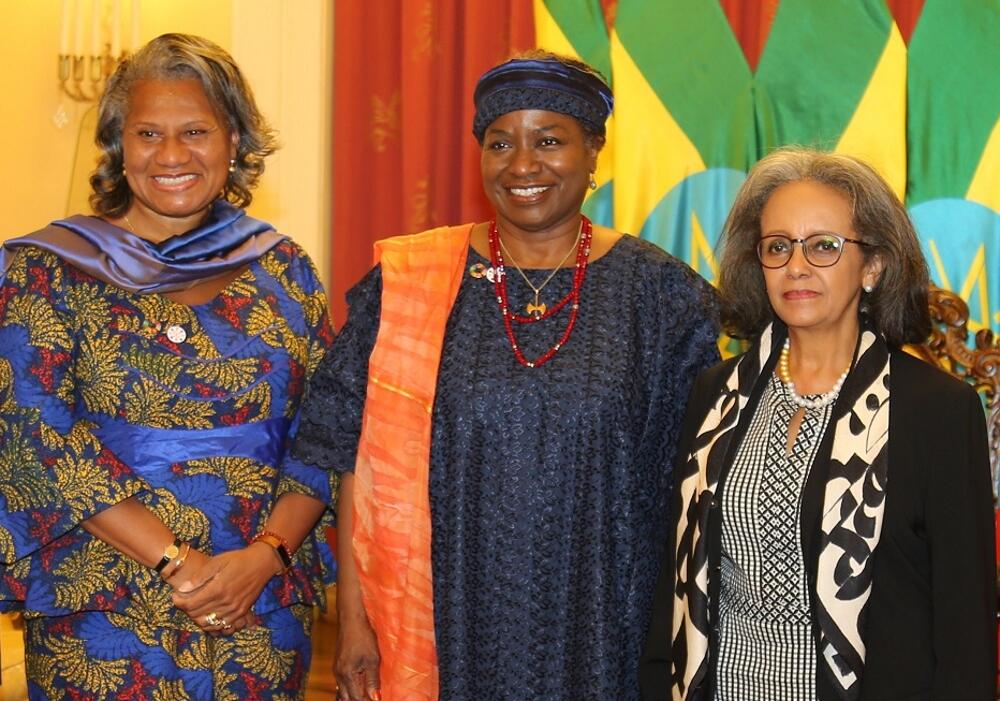ADDIS ABABA, Ethiopia—UNFPA, the United Nations sexual and reproductive health agency, recommitted to the revolutionary decision taken at the 1994 International Conference on Population and Development (ICPD) to ensure that every woman, man, child and young person is able to exercise their sexual and reproductive health and rights.
This undertaking was made at UNFPA’s Africa continental 50th anniversary celebrations in Addis Ababa, Ethiopia on 22 May. Critical investments need to be made in human capital, it was stressed during the special event, which was hosted by UNFPA Executive Director Dr. Natalia Kanem.

health sector, Ethiopia has made reductions in maternal and infant
mortalities a reality." - Ethiopian President Sahle-Work Zewde.
© UNFPA Ethiopia/Abraham Gelaw
Ethiopian President Sahle-Work Zewde acknowledged the progress made by her country in the past 25 years. “Ethiopia has made remarkable achievements in implementation of the ICPD Programme of Action, and targets in terms of policy formulation, programming, development of appropriate legal frameworks, adoption of relevant international instruments, and allocation of required resources and budgets,” she said.
Women and young people have become a priority in the country’s policies. “Ethiopia is one of the countries that has made successful efforts to expand access to education at all levels to let children, specifically young girls, attend schools at nearby residence, protecting them from social practices putting them in harm’s way,” she said. “By prioritizing maternal and newborn health through reforms in the health sector, Ethiopia has made and continues to make the reductions in maternal and infant mortalities a reality.”
Action must be radicalized to meet the ICPD promises

institutional commitments, I hope that each of us will commit
publicly to do our bit to fulfil the ambitious task that lies ahead."
- UNFPA Executive Director Dr. Natalia Kanem. © UNFPA Ethiopia
Since 1994, Africa’s population has doubled from 704 million to 1.32 billion in 2019. If the promises made at ICPD are to be realized, then action must be radicalized, especially where governments are concerned.
On the journey to the Nairobi Summit, UNFPA is ready and committed to overcoming any obstacles towards Africa’s progress, Dr. Kanem said.
“Over the past five decades, we have been guided by the unwavering belief that people must be at the heart of development. Today, people-centred development is the cornerstone of the 2030 Agenda for Sustainable Development Agenda,” she said.
“We gather tonight at a critical juncture on the road to Nairobi. As we work collectively towards determining national and institutional commitments, I hope that each of us will take a minute to reflect on our personal contributions — and commit publicly to do our bit to fulfil the ambitious task that lies ahead,” she said.
There is a window of opportunity within this generation to achieve the Africa we want and deserve. Decision-making must be inclusive, non-discriminatory and intentional across all sectors, including government, education and the economy, without any limits or exceptions!
She concluded with a call to action: “Let us commit to pick up the pace that leads us to an Africa of rights and choices, of prosperity, and of peace.”
We have the responsibility to bring change
Permanent Representative of Egypt to the African Union Osama Abdelkhalek called for interventions to be replicated and put into place, at a time when 27 of the world's 28 poorest countries are in sub-Saharan Africa and all of these have poverty rates above 30 per cent. If these numbers are to be reduced, an unwavering pledge by governments and other sectors must be made to provide education and skills training that prepares young people for employment, he said.
“This is our chance to emphasize access to holistic education that fully equips our young people for every aspect of their lives. The work ahead is enormous but not impossible. We have the responsibility to bring change, for this generation and the many that are yet to come,” he said.
- Cleopatra Okumu


